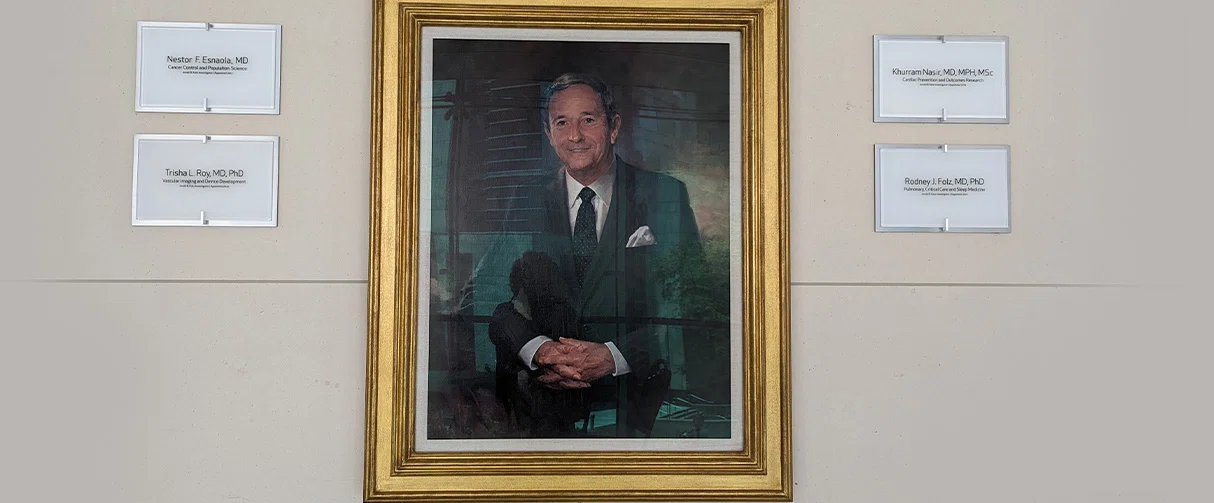


Outcomes Research
Katz Investigators at Houston Methodist
Katz Investigators Pave the Way for Translational Research at Houston Methodist

Houston Methodist Hospital has a long history of investing in research and fostering innovations that have the potential for clinical application. The Houston Methodist Research Institute focuses on streamlining the process of translating discoveries into direct treatments and cures for patients. A multidisciplinary team approach and an emphasis on collaboration over competition allows the institute to focus on novel approaches that result in concrete developments that further advance and enhance the treatment of the hospital’s patients.
A gift from the Jerold B. Katz Foundation has made that goal much easier to achieve, through several aims. The foundation was created to honor Jerold and Judith Katz’s son Lenny, who was permanently injured in an automobile accident in 1988. It has provided millions in funding for research into brain injury and other health care issues, but applications are open to researchers from any medical specialty conducting translational research. A significant portion of the foundation’s recent $21 million donation established the Jerold B. Katz Academy of Translational Research, which seeks to recruit—and retain—the world’s most promising transformational researchers in health care through its Katz Investigators program

Lenny Katz
Consequently, the gift is being used to support the research efforts of up to eight initial Katz Investigators. The fifth of the eight was recently brought on board: Tariq Shafi, MD, Head of the Division of Nephrology, Hypertension and Kidney Transplantation in the Department of Medicine. The four Katz Investigators preceding him were Nestor Esnaola, MD; Khurram Nasir, MD; Trisha Roy, MD, and Rodney Folz, MD, PhD. Shafi will seek to broaden the academic nephrology division with a focus on world-class patient care, clinical investigation and strong GME and CME programs.
Folz will seek to further our knowledge and understanding of asthma and chronic obstructive pulmonary disease (COPD) with the eventual focus on asthma-COPD overlap syndrome. He will examine bioactive lipids associated with oxidative stress to determine a racial phenotype for older adults with asthma and to assess whether it’s associated with poorer asthma control, highlighting the contribution that environmental factors have on the loss of asthma control. He also will use the funding to support ongoing collaborations with investigators at Texas A&M University and the Institute of Biosciences and Technology, with the goal of recruiting and characterizing COPD patients to identify mechanism-based sensitive biomarkers of genomic instability, proteomics and immune cell profiling for early diagnosis and disease prevention.
Rodney J. Folz, MD, PhD
Pulmonology, Pulmonary Critical Care
Chief, Division of Pulmonary, Critical Care and Sleep Medicine
Houston Methodist Academic Medicine Associates
Nestor F. Esnaola, MD, MPH, MBA, FACS
Hepatobiliary and Pancreatic Surgery, Surgical Oncology
Houston Methodist Department of Surgery
Esnaola is the Associate Director of Cancer Control in the Houston Methodist Neal Cancer Center (HMNCC). A Professor of Surgery, he also is Division Chief of Surgical Oncology and Gastrointestinal Surgery in the Department of Surgery at the Houston Methodist Hospital. He was awarded Katz Foundation funding to support his research in population sciences and cancer health disparities, as well as to help launch the Cancer Prevention and Control Research Program (CPC) at the HMNCC. The Research Program’s three main aims are to: 1) identify and understand factors that contribute to cancer risk (thus enabling the development of precision prevention strategies; 2) develop innovative strategies for early detection of primary and recurrent cancers through the discovery of novel biomarkers; and 3) develop and optimize cancer care delivery and survivorship from diagnosis to end of life.
Esnaola also leads the East Texas Cancer Study, which will extend the HMNCC’s cutting-edge CPC research initiatives (and eventually, its novel and robust community outreach and engagement programs) into lower East Texas, which has the highest prevalence of obesity in Texas (as well as higher rates of smoking and exposure to environmental carcinogens) and has the highest rate of cancer cases and deaths in the state. The study will deploy a novel, transdisciplinary, genes-to-society approach to unpack the association between obesity and cancer, help reduce cancer incidence and mortality in lower East Texas, and address persistent racial, ethnic, and rural disparities observed across multiple cancers, many of which are likely obesity-driven.
Nasir is a professor of Cardiology, chief of the Division of Cardiovascular Prevention and Wellness in the DeBakey Heart & Vascular Center and co-director of the Center for Outcomes Research. His research under the Katz Investigator funding is focusing on efforts to develop a systemwide hospital resource for research into cardiovascular disease prevention. He aims to harness the power of big data, innovative computation paradigms and artificial intelligence to integrate patients’ clinical and research data and to identify gaps in preventative care among high-risk individuals. According to Nasir, big data analytics and digital application platforms offer unique opportunities for value-based health care delivery and more efficient cardiovascular population management. Applications under review include patient care dashboards, clinical decision support systems, mobile patient engagement applications and key performance indicators. He hopes that results from this work will enable the development of solutions that can inform the actions of clinical and policy decision makers and other stakeholders and improve engagement strategies with the public and patients
Khurram Nasir, MD
Preventive Cardiology, Cardiology
Houston Methodist DeBakey Cardiology Associates
Roy, a vascular surgeon-scientist as well as a Houston Methodist Clinical Scholar, is studying advanced imaging options to develop an imaging method for evaluating blood vessel blockages — usually a sign of plaque buildup in the arteries — that will allow surgeons to precisely tailor surgeries and endovascular procedures to individual patients. The Katz Investigator award is funding a project in which Roy is using advanced MRI imaging, using the Siemens 7-Tesla MAGNETOM Terra MRI (the first 7T MRI scanner approved for use in the U.S.), to evaluate blockages. The aim is to determine where minimally invasive techniques will be warranted based on the blockages’ characteristics.
Trisha Roy, MD, PhD, RPVI, BASc
Vascular Surgery
Houston Methodist Cardiovascular Surgery Associates
Her team also is looking at imaging techniques to identify different plaques and comparing the results against real specimens to ensure the suggested methods are consistent and valid; a good correlation has been observed thus far. Ultimately, Roy hopes that these techniques will be used in patients before they get the blockages, to characterize those who will have higher failure rates with the minimally invasive treatment so that such patients can be more effectively recommended to require bypass surgery. According to Roy, the research can be immediately translated to the operating room because the devices being tested are already approved for use.
Shafi is a physician-scientist with more than 140 peer-reviewed papers, reviews and book chapters and is currently on the editorial boards of the Clinical Journal of the American Society of Nephrology, Kidney 360 and the American Journal of Medicine. He has had continuous NIH research funding for the past 20 years on topics including: the impact of renal failure on cardiovascular outcomes and hypertension, the science and application of hemodialysis and efforts to reduce healthcare disparities for kidney transplant patients. He has served on several nephrology-related NIH study sections. Shafi has mentored dozens of graduate students and residents in their research careers and has been awarded numerous teaching and mentorship awards. He has been elected to Fellow status in the following societies: The American College of Physicians, the American Society of Nephrology, the Southern Society of Clinical Investigation and the National Kidney Foundation. He has been awarded a Katz Investigatorship to support his research efforts. He will begin broadening the academic nephrology division with a focus on world-class patient care, clinical investigation and strong GME and CME programs.
Luanne Jorewicz, August 2022
Related Articles









